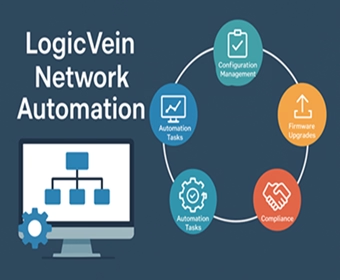Network Automation Made Easy with LogicVein Playbooks
In modern IT environments, managing network operations manually is no longer scalable—or safe. Errors, delays, compliance gaps, and inconsistent execution can quickly derail performance across enterprise networks. LogicVein solves this challenge with Playbooks: an automation engine built into our Net LineDancer and ThirdEye that lets you automate complex workflows with push-button simplicity.
✅ What Are LogicVein Playbooks?
Playbooks are automated workflows made up of sequential "plays" (or nodes), each representing a specific action, check, or decision point. With Playbooks, you can eliminate repetitive manual tasks and enforce consistent processes across large networks.
Common automation use cases include:
• Device configuration backups
• Configuration updates
• Security policy enforcement
• Firmware and OS upgrades
• Compliance verification
• Compliance Remediation
• Incident/alert Remediation
• Monitoring and health checks
Once created, a Playbook can be triggered with a single click or scheduled to run automatically across targeted devices.
🎛️ How Playbooks Work
Playbooks are visually constructed using a drag-and-drop interface. Each Playbook is comprised of nodes, which may include:
• Command execution (e.g., CLI actions via SSH)
• Validation checks
• Conditional branching
• Rollback steps
• Variable handling
• Script-based automation
Because the Playbook tools use CLI-based access, we support a wide range of vendors.
💡 Why Teams Use Playbooks
Organizations turn to Playbooks for three main reasons:
✔ 1. Consistency
No more variation in how tasks are executed—every job runs the same way, every time.
✔ 2. Scalability
Manage dozens, hundreds, or thousands of network devices without increasing manual effort.
✔ 3. Risk Reduction
Rollback, verification, and branching capabilities reduce outages and human error dramatically.
🌟 Best Practices for Building & Managing Playbooks
To get the full value of Playbooks, follow these proven best practices:
✅ 1. Start Small & Modular
Begin with focused tasks like backups, interface checks, or compliance commands. Build confidence before scaling into full workflows.
Tip: Use smaller Playbooks as reusable components in larger workflows.
✅ 2. Use Naming & Versioning Standards Clear naming conventions (e.g., Backup_Core_Switches_v1.2) make it easier for teams to understand a Playbook’s intent and lifecycle.
✅ 3. Always Include Validation
Follow the pattern: Execute → Validate → Continue/Roll Back
Don’t assume a command succeeded—verify it.
✅ 4. Plan for Failures (Rollback Ready)
Every Stage 1 action should have a Stage 2 fallback. Design for worst-case scenarios:
• Failed upgrade? Roll back.
• Credential mismatch? Stop gracefully.
• Partial change? Revert automatically.
✅ 5. Test in a Sandbox First
Clone the Playbook and apply it to a lab device, staging group, or non-critical segment before going global.
✅ 6. Use Conditional Logic
Branching nodes let you create decisions like:
• If firmware is outdated, upgrade.
• If compliance fails, apply the correct baseline.
• If connection fails, skip device and continue.
✅ 7. Document Internally
Add descriptions to nodes and include metadata like:
• Change intent
• Device coverage
• Dependencies
• Required credentials
✅ 8. Schedule What You Can
Use scheduled Playbooks to automate backups, drift detection, compliance checks, or inventory updates.
✅ 9. Monitor & Iterate
Review logs, failure points, and execution time. Update Playbooks as firmware, vendors, and network standards evolve.
🚀 Real-World Playbook Examples
Here are a few workflows teams commonly automate:
🔹 Backup & Drift Check
1. Login to device
2. Pull config
3. Compare to baseline
4. Alert or auto-remediate
🔹 OS/Firmware Upgrade
1. Verify current image
2. Upload new OS
3. Install
4. Validate
5. Roll back if needed
🔹 Compliance Enforcement
1. Gather configuration
2. Match against policy rules
3. Correct mismatches
4. Log status & notify IT
📌 Final Takeaway
LogicVein Playbooks transform time-consuming network operations into reliable push-button workflows. With visual node-based automation, conditional logic and rollback safety, they make enterprise-grade automation approachable—even for lean IT teams.
Playbooks can help to keep your network safe and secure.
With LogicVein, you don’t just react to changes — you control them.
Watch our series of videos here or see all our features here.
With its combination of discovery, monitoring, compliance, and automation, LogicVein transforms how IT teams manage complex network environments.
Whether you’re looking to reduce manual work, improve network reliability, or gain better visibility into device configurations, LogicVein will provide you the tools you need—all in a single platform.
Ready to see LogicVein in action? Request a Demo and discover how you can simplify operations, improve reliability, and gain full network visibility.
#LogicVein #SmartBridge #NetworkAutomation #NetworkManagement #NetworkCompliance #ChangeManagement #MSPTools #MultiVendorNetworks




